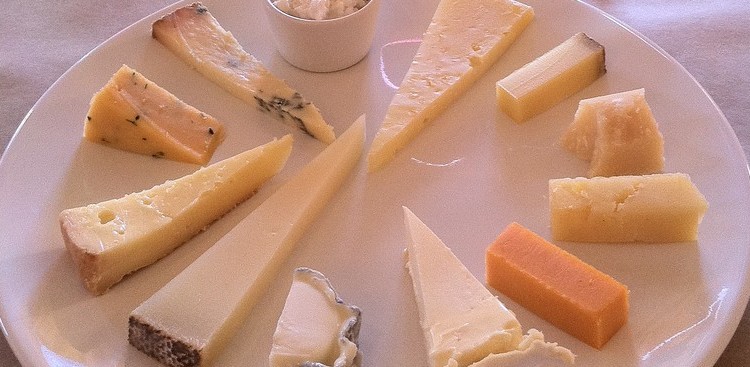
In this blog series, intern Julia explores the everyday language surrounding cheese, from etymology to idioms to associations. Learn why we “say cheese” when we take a photo, why once upon a time we believed that the moon was made of green cheese, or even the history of the word itself. Last time, we learned about why we refer to some people as big cheeses Plus, be sure to answer the prompt at the end of the post each week for a chance to win a copy of culture’s ultimate cheese pairing guide: Cheese+. Congratulations to last week’s winner: Shirley. Good luck to everyone for this (the final!) week!
As both a cheese-lover and a self-proclaimed English nerd, I was quite happy to learn that the word “cheese” had integrated itself into the language and culture I’ve grown to love. Starting out, I knew a few cheese phrases and associations, but I’ve learned so much more than I expected to since starting this little blog series about two months ago. I came across several phrases I had never heard of before that I couldn’t find room in this series for: hard cheese, like chalk and cheese, cheese it. There’s even a phrase in the modern gaming world, “cheese strategy,” for video game schemes that are effective but do not require much work. I also found more examples of how cheese associations work in pop culture. Through compiling research for these posts, my appreciation for both cheese and English grew hundredfold – and I hope I was able to extend some of the learning to you!
The best place to start, I decided, was at the beginning. Without the etymology of cheese, how would we hope to understand the different uses of the word? Well, it turns out most cheese idioms and associations don’t have much to do with the actual dairy product. When a photographer asks his subjects to “say cheese,” he’s not thinking of yummy curds but instead of how wide people’s mouths get when they say that “ee” sound. And an old rumor that cheese gives you nightmares is founded only in the mind of Dickens, although the amino acid tryptophan, found in cheese, may make dreams more vivid. Next, we looked at the only time the ideas of “cheese” and “annoyance” should ever be put together: when you want to express how cheesed off you are! Throughout pop culture, cheese and mice have gone hand-in-hand (or rather crumb-in-paw), but it turns out mice’s sensitive noses find the scent of cheese a bit too powerful for regular munching. After that we tested how gullible we were by looking at the moon through a cultural microscope to see what it was made of. Finally, we considered all of the big cheeses in our lives, and how we got from a positive British phrase to a derogatory classification.
Sadly, I have neither the time nor the mental willpower to investigate every cheese-y phrase that ever existed, but there are plenty out there! Cheese has made its way into our day-to-day language and culture as well as the history books, novels like Dickens’ A Christmas Carol, or even poems. Happy for us curd-aficionados, the word cheese is as versatile and varied as its physical store counterpart. Cheese has appeared in phrases and ideas for hundreds of years now, and will undoubtedly continue long after this blog series comes to a close. If you were to invent a new cheese phrase, what would it be and what might it mean? Or, what idiom would you still like to know more about? Answer in the comments section by May 27, 2014 at 12:00 midnight EDT for a chance to win a copy of our popular special issue, Cheese+. The winner will be contacted via email. Thank you for reading!
Featured image by pkingDesign via Compfight cc




Thanks, looking forward to receiving the Cheese pairing guide.
Why do we use ‘cheesy’ to mean sort of corny? Oh and why corny, while I’m at it — though I realise this is not your metier.
We do a gouda job making cheese brie-cause our cheese makers are the best!
Fromage to Yours (From Ours to Yours) – it is the name of my company in Colorado.
I would like to know more about “like chalk and cheese.”
I would love to hear more about the idiomatic expression “cheesed off”.